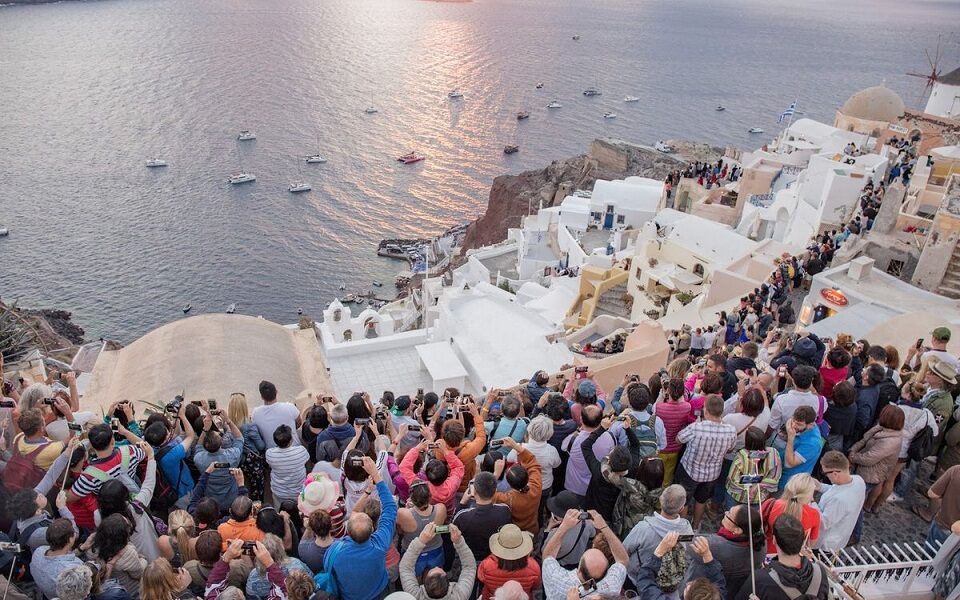Why the tourism boom in Greece does not bring happiness to local residents
Greece is once again at the peak of popularity among global tourists, industry revenues are hitting record highs, and photos of Greek islands have flooded social networks. However, behind this outward prosperity lies a surprising and troubling paradox: almost half of the country’s residents cannot afford even a week-long vacation at the height of summer. How is it that the influx of billions of euros into the economy does not make life better for Greeks themselves? Why does a tourist paradise for foreigners become unattainable for the majority of local residents?

The tourism boom in numbers
Just ten years ago, Greece was struggling with the consequences of a deep financial crisis, and the COVID-19 pandemic dealt a new blow to this vital sector. Today, according to the Bank of Greece, the situation has changed dramatically. In the first half of 2025, tourism revenues increased by 11% compared to the same period last year, reaching €7.66 billion. The number of visitors increased only slightly—by just 0.6%—but the average spending per tourist jumped by 10%.
The largest contribution to the influx of funds was provided by tourists from Germany, Italy, the United Kingdom, and the USA. In particular, in June 2025 alone, Germans spent almost €595 million in Greece, which is 18.6% more than last year’s figure. French visitors left about €192 million, Italians—€180 million, and Americans increased their spending by 64.7%, up to €247 million.
What is really happening if we thoroughly examine these impressive figures? Why is Greek society increasingly asking who actually benefits from the tourism boom?
Who benefits from the tourism boom in Greece
Naturally, it primarily benefits the tourism industry and businesses, from hotels to airlines and tour operators. Private investors who invest in real estate also receive substantial profits. In addition, there is another sector that significantly benefits from the flow of tourists—of course, we are talking about casinos. They are actively integrating into Greece’s tourism infrastructure and attracting high-income visitors.
At the same time, the high prevalence of online casinos has almost no effect on the attendance of land-based casinos. This is because they target different economic categories. Online casinos focus on attracting a mass audience—this is confirmed by experts based on data from this website with information about no deposit bonuses, as well as from other thematic resources.
At the same time, casinos in Greece are aimed specifically at tourists, since gambling is restricted for Greeks. Accordingly, this sector really benefits from the increase in tourist flow. But this also makes it part of the problem.
The flip side of success
Behind the growth in revenues lies the term “overtourism.” This is a phenomenon in which the number of guests is so great that it puts pressure on infrastructure, the housing market, and the environment. For Greece, as for other popular destinations in Europe, this problem is becoming increasingly relevant.
Short-term rentals, popular among foreign travelers, push housing prices up, making it unaffordable not only for tourists but also for local families. Power grids, sewage systems, and public transport are forced to operate at full capacity. Local communities note a deterioration of their usual way of life and a decline in quality of life.
A vivid example is the island of Santorini. Here, with a population of about 15,550 people, the annual number of tourists exceeds 5.5 million. This puts enormous pressure on public services and infrastructure. From January to May 2025, tourist flow to Santorini fell by 24.4%. Even tourists themselves are increasingly complaining about crowding and overpopulation.
“Even tourists in Santorini complain about the large number of tourists,” says a 2024 report. All these signs indicate that tourist appeal turns into new challenges for the region.
This raises the question of how sustainable further tourism development is under such conditions, and whether overload will lead to the loss of the unique character of these places. Similar trends are observed in France, Spain, and Croatia, where dissatisfaction among local residents and deterioration of infrastructure due to the influx of guests are also being recorded.
Who wins and who is left behind
While hoteliers and owners of rental apartments report record profits, for most Greeks tourism does not bring noticeable benefits. According to Eurostat, 46% of the country’s population cannot afford a week-long vacation, while the EU average is 27%. This statistic reflects deep social inequality, exacerbated by rising prices for housing, transport, and services.
The story of Ismini Balale, a 28-year-old Greek woman published in The Guardian, became a symbol of the problem. Despite having a higher education, she works in retail and earns a salary of €850 per month. Even a modest room on the seaside costs about €200 per night, which makes vacation practically impossible for her and her friends.
The comparison of travel costs for a family of four with their average income is especially telling. Just for ferry tickets to Aegina, a family will spend about 450 euros, while the average monthly salary in the country is 1,380 euros. This raises the rhetorical question: who actually has access to the Greek paradise, which has become a dream for millions of foreigners but unattainable for many residents of Greece itself?
Challenges and threats to the future
Problems related to accessibility and overload are exacerbated by new challenges. Climate disasters are becoming a serious threat to the tourism sector. In the summer of 2025, severe fires on Corfu, Zakynthos, and Lefkada forced the evacuation of vacationers and raised concerns for the safety of guests.
Hotel owners and entrepreneurs share opposing views. Some are confident that demand will remain high despite any difficulties. Others warn that in the long term such a policy undermines the foundations of the tourism industry. Pressure is growing on public resources, transport, and the environment. If new approaches are not implemented, Greece may repeat the fate of Venice or Barcelona, which are already facing mass protests from residents against overtourism.
Many experts point to the danger of turning the entire country into a “tourist attraction,” where the interests of the local population are pushed into the background. The new reality requires a rethinking of industry development strategies.
How the situation can be changed
According to experts, the solution lies in finding a balance between economic benefit and sustainable development. Possible strategies include:
- developing alternative destinations to relieve popular regions;
- strengthening regulation of short-term rentals to protect the interests of local residents;
- targeted investments in infrastructure and environmental projects;
- supporting domestic tourism and creating special programs for Greek families.
Other EU countries are applying various measures to contain overtourism: introducing tourist taxes, restricting apartment rentals, and promoting less crowded routes. This leaves the question open: will Greece be able to maintain its status as a tourism powerhouse without losing the well-being of its own citizens and the uniqueness of its cultural space?
The problem of contradictions between outward success and the internal inaccessibility of vacations for locals remains one of the main topics for discussion in the coming years. Greece stands at a crossroads and is searching for a path to balance, so that paradise views and sunny resorts delight not only tourists but also the country’s own residents.
Search by Tag
- #familyconstellations
- #lifecoaching
-
- The New Slot Games Taking Italy by Storm
- Greek regulators step up the fight against gambling addiction and promise change
- How the Piazza project is transforming the face of Regency Thessaloniki Casino
- Bc.game Nigeria: The Complete Guide to Playing, Bonuses, and Payments
- BCGame マンスリーボーナス完全解説:毎月の特典と受け取り方法








